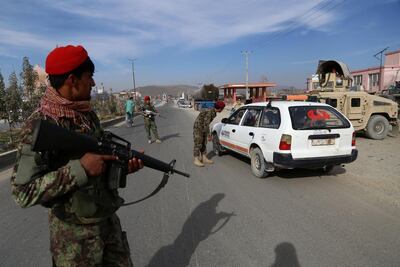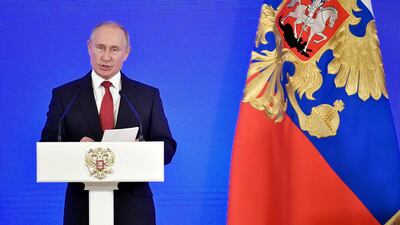Seventeen years after launching its war to oust Taliban insurgents in Аfghanistan, the United States is discovering that an old adversary has wedged itself into the conflict: Russia.
The foreign ministry in Moscow has announced it plans to host peace talks in the Russian capital this week, in a move that may alarm Western officials, and mirrors Russia’s resurgent role in conflicts throughout the wider Middle East.
A foreign ministry statement released on Friday said 11 countries including the United States had been invited on November 9, touting that "it will be the first time that a delegation from the Taliban's political office in Doha will attend such a high-level international meeting".
A source close to the Afghan president told The National that the government will not send an official delegation. “Members from the High Peace Council (HPC) will be attending the talks in their own capacity,” he said on the condition of anonymity, referring to the independent body of religious leaders and prominent Afghans, assigned to facilitate negotiations with the insurgency.
In a statement issued on Monday, the Afghan Ministry of Foreign Affairs also voiced criticism over the meetings, adding its representatives would not join the talks in Moscow. “Our agreement with the Russians is that this meeting should lead to direct talks between the Afghan government and the Taliban. However, only a group of people were invited and that reflects the intention of Taliban who are not yet willing to negotiate peace with the government,” foreign ministry spokesperson Sibghat Ahmadi said.
The Taliban have confirmed their presence at the talks, adding in clarifications that they will not negotiate at the meeting.
“This conference is not about negotiating with any particular side rather it is a conference about holding comprehensive discussions on finding a peaceful solution to the Afghan quandary and ending the American occupation,” Zabihullah Mujahid, the Taliban spokesperson said in a statement issued by the group on Tuesday.
This is Russia’s second attempt at bringing the Afghan government and the Taliban to the negotiating table this year alone. Moscow's plans for negotiations embarrassingly fell apart amid bickering after the Afghan government refused to attend.
“The Afghan government refused to participate [in September] when their conditions were not met, which included a demand to co-chair the talks and provide state protocols to only the Afghan government,” said Hekmatullah Azamy, a political analyst with Centre for Conflict and Peace Studies, a Kabul-based think tank.

“The Taliban also raised concerns over the Afghan demands, which is perhaps why the government has decided to send Ullemas from the peace council instead of an official delegation,” Mr Azamy said.
Moscow’s redoubled efforts to bring together senior Taliban and Afghan leaders are a sign of frustration over Washington’s failure to bring the conflict to a close, says Artemy Kalinovsky, Senior Lecturer in East European Studies at the University of Amsterdam.
“For the Kremlin, these talks are an insurance policy,” he told The National. “Russian officials don't believe the United States can or will ‘finish the job’ in Afghanistan. From the Russian perspective, the Taliban is going to be a part of any solution, so you might as well start talking.”
_______________
Read more:
Czech soldier killed in apparent insider attack in Afghanistan
Afghans vote for second day amid violence and technical problems
Taliban kills 26 Afghan forces as election bloodshed continues
_______________
Russia’s deepening role in Afghanistan – and its seemingly cosy relationship with the Taliban – has come under growing scrutiny in recent years. General John Nicholson, who was the most senior ranking US military official in charge in Afghanistan until August this year, repeatedly accused Russia of supplying arms to the Taliban.
Those claims were dismissed by the Russian Embassy in Kabul as “idle gossip”. In response to the US claims, foreign ministry spokesperson, Maria Zakharova said the US and Nato were likely behind “unidentified” helicopters supplying arms to ISIS in Afghanistan.
The spat illustrates how the competition between the United States and Russia to take charge of the peace negotiations is ratcheting up.
“The Americans are putting their weight behind the Afghan government, while the Russians feel they need [to back] people in the opposition,” Mr Azamy explained, referring to the reports that claimed former President Hamid Karzai and a prominent opposition leader, Atta Noor, were among those invited to attend the Moscow talks.
“I strongly believe that without the Russians, the Americans can’t be successful and without the Americans the Russians can’t make progress on the talks,” he said, adding that the Russians understood this dynamic and have been coordinating with US Special Ambassador Zalmay Khalilzad through backchannel negotiations.
Citing personal sources, Mr Azamy said that while Mr Khalilzad will not be attending the talks himself, “his representatives – people from think tanks that work with the US government – will be present”.
“At this point, it is very much up to the Americans to balance the equations and see how they can work with the Russians,” he added.
The unlikely alliance between the Taliban and Moscow comes 30 years after the insurgents ousted Soviet troops from Afghanistan, ending a long and costly occupation, which is still fresh in the minds of many Russians. The budding ties also point to where the Kremlin’s security concerns lie now, decades on.
“The Kremlin is much more worried about Islamic State than they are about the Taliban,” Mr Kalinovsky explained. “After all, the Taliban has never really had ambitions beyond the territory of Afghanistan. Islamic State certainly does.”
ISIS militants from Central Asia last year claimed one of the deadliest terror attacks in recent Russian history after detonating a bomb on the metro in St Petersburg, killing 16. Another ISIS attack earlier this year in Tajikistan, in which four western cyclists were killed, has stoked Russian concerns over the security of former Soviet countries.
In turn, the Taliban has sought to reassure Moscow it is a reliable partner, capable of securing Soviet-era borders. In an interview with a pro-Kremlin tabloid last year, former Taliban leader Syed Mohammad Akbar Agha reiterated that the Taliban poses no direct threat to Russia.
“Russia has its strategic goals, and we, the Taliban, have ours,” he said. “But we are united. We consider the former Soviet republics to be the Russian border and we are able to provide stability and security of these borders.”
“The Russians share a common cause with the Taliban,” Mr Azamy reiterated, namely, “the withdrawal of the US troops.”

